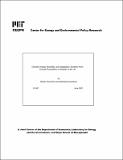Climate change, mortality, and adaptation : evidence from annual fluctuations in weather in the US
Author(s)
Deschênes, Olivier; Greenstone, Michael
Download2007-007.pdf (561.0Kb)
Other Contributors
Massachusetts Institute of Technology. Center for Energy and Environmental Policy Research.
Metadata
Show full item recordAbstract
This paper produces the first large-scale estimates of the US health related welfare costs due to climate change. Using the presumably random year-to-year variation in temperature and two state of the art climate models, the analysis suggests that under a "business as usual" scenario, climate change will lead to an increase in the overall us annual mortality rate ranging from 0.5% to 1.7% by the end of the 21st century. These overall estimates are statistically indistinguishable from zero, although there is evidence of statistically significant increases in mortality rates for some subpopulations, particularly infants. As the canonical Becker-Grossman health production function model highlights, the full welfare impact will be reflected in health outcomes and increased consumption of goods that preserve individuals' health. Individuals' likely first compensatory response is increased us of air conditioning; the analysis indicates that climate change would increase US annual residential energy consumption by a statistically significant 15% to 30% ($15 to $35 billion in 2006 dollars) at the end of the century. It seems reasonable to assume that the mortality impacts would be larger without the increased energy consumption. Further, the estimated mortality and energy impacts likely overstate the long-run impacts on these outcomes, since individuals can engage in a wider set of adaptations in the longer run to mitigate costs. Overall, the analysis suggests that the health related welfare costs of higher temperatures due to climate change are likely to be quite modest in the US.
Date issued
2007Publisher
MIT Center for Energy and Environmental Policy Research
Other identifiers
2007-007
Series/Report no.
MIT-CEEPR (Series) ; 07-007WP.